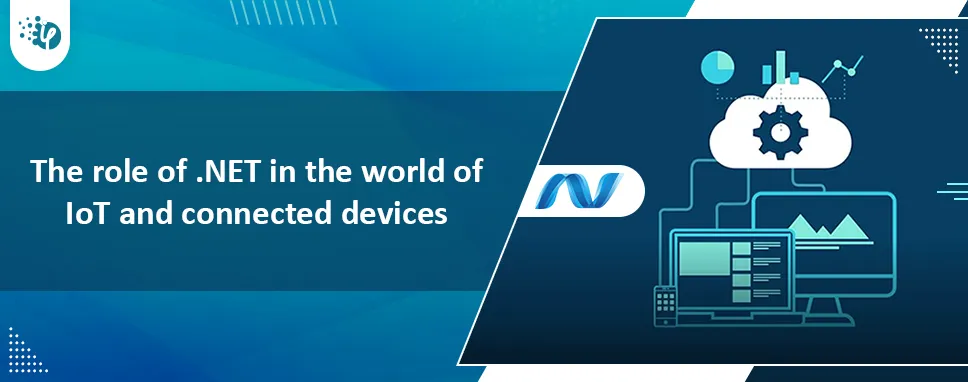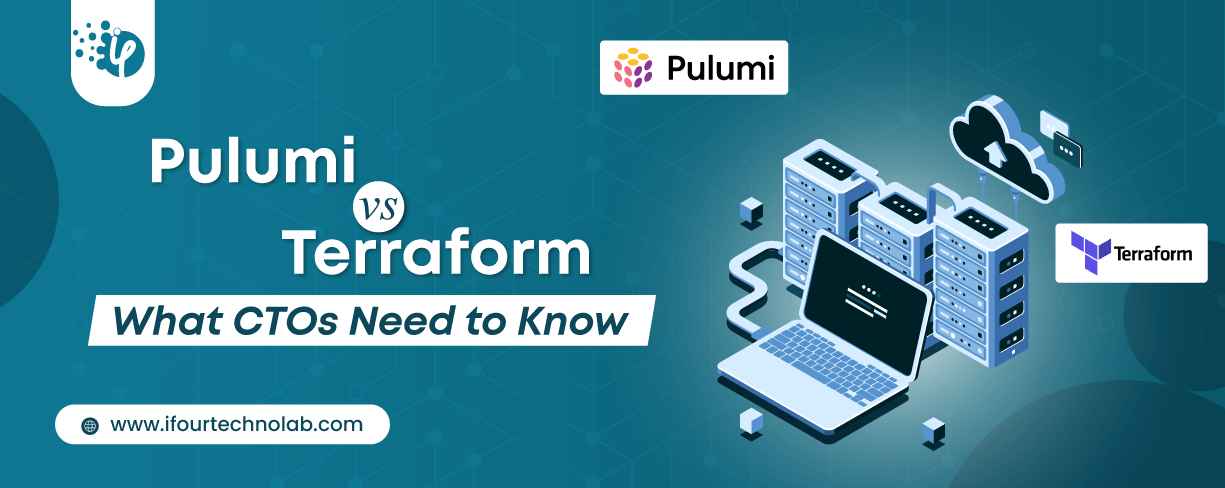How to Do Forecasting in Power BI (Steps & Accuracy Metrics)
Remember our last guide - Power BI forecasting? It revealed things that truly blocks accuracy, both structural and situational. Now it's time to take the next step. Knowing Power...
Listening is fun too.
Straighten your back and cherish with coffee - PLAY !

The IoT is a booming technology having potential to revolutionize diverse industries with flawless and faster data connectivity. With the emergence of these connected devices, it's become possible to manage everything from our homes to appliances and cars with just a click. However, building and managing these devices requires a robust framework that can handle the complexity of modern applications. This is where .NET comes in.
.NET is a leading custom software development framework developed by Microsoft with massive community support. It has proven to be a powerful platform for developing various applications from desktop to reliable, secure, and scalable IoT-based applications.
In this article, we will explore the role of .NET in the world of IoT devices, and how it is helping to shape the future of technology.
1. Platform for Development: .NET is a powerful platform allowing developers to create secure, reliable, scalable connected device applications. It provides a comprehensive set of tools and features, including a wide variety of device APIs, easy integration with cloud services, etc.
2. Cross-Platform Support: .NET is a cross-platform framework, which means that developers can create applications for a variety of devices, regardless of their operating system. This makes it easy for developers to create applications for different types of devices, including smartphones, tablets, wearables, and other connected devices.
1. Improved Security: .NET enhances the security of linked devices. It provides a safe and trustworthy environment for IoT software development and assures data security at all times.
2. Reduced Development Time: .NET provides developers a comprehensive set of libraries, which makes it easy for developers to quickly create applications without having to learn new technologies.
1. Smart Home Automation: .NET can be used to create applications for controlling smart home devices, such as lights, thermostats, and security systems.
2. Wearables: .NET can also be used to create applications for wearable devices, such as fitness trackers and smartwatches. Developers can use .NET to create applications that can be used to track fitness data and receive notifications.
Today, IoT and connected devices are increasingly used. DOTNET developers can build physical-world-interacting apps and services using its vital tools and frameworks. They can also use .NET APIs and services to control connected devices making its applications interact with sensors, actuators, and other devices flawlessly. .NET may also construct cloud services that store and process device data. This can be used to build powerful analytics tools to understand how people utilize their connected gadgets. Developers may build robust apps for linked devices using. NET.
.NET is an incredibly versatile and powerful platform that has been adopted by many organizations as they look to build IoT and connected devices solutions. Its vast array of features and capabilities make it a great choice for building robust, reliable applications that can scale easily and be adapted to a variety of industries. Most IoT solutions involve devices connected to the internet, and .NET is an ideal platform for building these systems. Its rich set of development tools and its cross-platform compatibility it easy to create reliable, scalable systems that can be used in various industries. Additionally, its support for Windows 10 makes it very popular with businesses looking to deploy IoT solutions in their workplace. Overall, .NET is an extremely versatile platform that is well-suited for building IoT and connected device solutions. Its rich set of features and capabilities make it a great choice for businesses looking to implement innovative solutions that can help them achieve their goals.
The .NET technology has become increasingly important in the world of the Internet of Things (IoT) and connected devices. As connected device connectivity is rapidly growing, IoT companies are looking to develop reliable, secure, and efficient solutions that involve sending data between applications over a network connection.
At the same time, they need to include features such as robust authentication mechanisms, remote configuration updates and accurate performance tracking. This requires advanced software development capabilities to build comprehensive solutions quickly—enter .NET technology.
Today's .NET platform offers developers access to specialized libraries designed specifically for IoT projects using smaller microcontrollers like Arduino or Raspberry PI processors. This makes it easier for developers when coding these sorts of projects and provides useful debugging tools for troubleshooting any issues that may arise during testing or deployment phases.
Moreover, by relying on Standard Query Language (SQL), many databases can be easily connected with existing application back-ends through either wired or wireless interfaces; enabling information exchange between different systems with minimal effort required on the developer’s side – which is highly advantageous when developing complex pieces of hardware like sensory arrays or industrial automation systems - without sacrificing performance stability nor code readability/maintainability standards expected from contemporary software solutions such as those found in IoT products intended for mass market consumption nowadays.
As well as scalability benefits due its use of managed code libraries included within the framework itself – allowing cost effective sharing among multiple systems regardless if they run on-site servers (such as embedded devices), enterprise servers (like Windows Server 2012 R2) or cloud services hosted at Microsoft Azure depending on their underlying requirements - without any rewrites being necessary thanks to language interoperability support enabled with cross-platform CLR compilers found as part of standard SDK throughout all supported platforms; meaning that applications developed under one target environment can be recompiled almost instantly against others upon request while remaining fully compatible even after several releases have been issued post initial conception / deployment stages accordingly too further increase overall savings at all levels while maintaining corporate quality levels expected from certified programming standards used worldwide today throughout every possible industry dealing with electronic components directly integrated into their daily operations workflow processes effectively consequently making enterprise leveraging process much simpler & faster than ever before currently thus providing end users with significant advantages whenever prototyping new concepts & implementations involving distributed systems interacting against each other over pre-established communication protocols thus boosting innovation potential significantly worldwide through usage scenarios that where not foreseen until recently making them now available relatively easily / cost effective currently paving way towards what some people expect nowdays commonly referred two simply yet accurately enough known henceforth just plain “ConnectedWorld” vs “UnconnectedWorld”
.NET is one of the most popular programming languages in the world today. It's been around for a long time, and that means it's been refined over the years. And with all of this experience, it is a great choice for building innovative applications for connected devices. This can range from IoT (Internet of Things) to wearable technology, including smartwatches and fitness trackers. It's no wonder that a lot of companies are using.NET to build their revolutionary new products. As a matter of fact, a few of the top companies in the world, like Microsoft, Sony, and Nike, have built their IoT products with .NET. It's clear that .NET is a wise investment for companies looking to automate and grow their business.
.NET is a framework developed by Microsoft that can be used to build a wide range of applications, including those for the Internet of Things (IoT) and connected devices. The role of .NET in the world of IoT is to provide a set of tools and technologies for building IoT solutions that are powerful, flexible, and easy to use.
One of the key benefits of using .NET for IoT is that it allows developers to create applications that can run on a variety of platforms and devices. This includes Windows, Linux, and macOS operating systems, as well as a wide range of IoT devices such as sensors, gateways, and edge devices.
Another benefit is the use of C# programming language, which is a modern, high-level language that is easy to learn and use, making it accessible to a wide range of developers. C# also offers a rich set of libraries and frameworks that can be used to build IoT solutions quickly and efficiently.
.NET can be used in a variety of IoT use cases such as connected homes, smart cities, industrial IoT, and healthcare IoT. For example, in a connected home, .NET can be used to develop applications that control lighting, temperature, and security systems. In industrial IoT, it can be used to build solutions that monitor and control industrial equipment and systems. In healthcare, it can be used to develop applications that monitor patients' vital signs and alert healthcare professionals in case of an emergency.
In summary, .NET plays a vital role in the world of IoT by providing a set of tools and technologies for building IoT solutions that are powerful, flexible, and easy to use. The benefit of using .NET includes its ability to run on a variety of platforms and devices, C# programming language and its rich set of libraries and frameworks, which can be used to build IoT solutions quickly and efficiently. It can be used in a variety of IoT use cases such as connected homes, smart cities, industrial IoT and healthcare IoT.
The .NET framework is an invaluable asset for developers across the world, especially when it comes to developing connected devices and the Internet of Things (IoT). .NET provides developers with a range of benefits and features that make it the ideal platform for developing and deploying connected devices and IoT applications.
First and foremost, .NET is a highly secure platform. It offers a range of features such as authentication and authorization, encryption, and data protection, which ensure the security of connected IoT devices. It also provides developers with a range of tools to monitor and control access to connected devices and data.
Another benefit of .NET is its scalability. It allows developers to quickly and easily scale their IoT applications. This means that as more devices are connected, it is easy to adjust the application to handle the increased traffic.
Finally, .NET is a highly versatile platform. It can be used to develop applications for a wide range of connected devices, including wearables, home appliances, and industrial equipment. This makes it the perfect platform for creating a variety of IoT-related applications.
In short, the .NET framework is an invaluable asset for developers who are looking to build connected devices and applications for the IoT. It offers a secure, scalable, and versatile platform that allows developers to develop and deploy connected devices and IoT applications quickly and easily.
The .NET framework provides a robust and scalable platform for building IoT solutions. It offers a wide range of libraries and tools for developing IoT applications, including support for device-to-cloud communication, data management, and integration with other technologies such as AI and ML.
One of the key advantages of using .NET for IoT development is its ability to support both Windows and Linux operating systems. This allows developers to build IoT solutions that can run on a wide range of devices, from small microcontrollers to powerful servers.
.NET also provides a wide range of libraries and frameworks that can be used to develop IoT applications, such as the Azure IoT Hub and the Azure IoT Device SDK. These libraries and frameworks provide developers with the tools they need to easily connect devices to the cloud, manage device data, and integrate with other technologies, such as machine learning and artificial intelligence.
Additionally, .NET has a strong community of developers who constantly contribute to the development of libraries and frameworks that help in IoT development. This makes it easier for .NET developers to find and use libraries, tools, and technologies that are specifically designed for IoT development.
Overall, the .NET framework provides an ideal platform for building IoT solutions that are robust, scalable, and can run on a wide range of devices. It offers a rich set of libraries and tools that make it easy for developers to build IoT applications and integrate them with other technologies. With its growing popularity, the role of .NET in the world of IoT and connected devices is expected to continue to grow in the future.
The .NET framework provides a set of libraries and tools that allow developers to build software that can run on a wide range of devices, including those with limited resources such as IoT devices. This makes it a suitable choice for building IoT solutions.
One of the key features of .NET that is relevant to IoT is its support for a variety of programming languages, including C# and Visual Basic. This allows developers to use the language that they are most comfortable with when building IoT applications.
Another important feature of .NET for IoT is its support for communication protocols such as MQTT, AMQP, etc. These protocols are commonly used in IoT systems to facilitate communication between devices, and the support provided by .NET makes it easier to implement these protocols in IoT applications.
Furthermore, .NET provides tools and libraries that allow developers to create web services that can be used to connect IoT devices to the cloud and other systems. This is important because many IoT solutions require that devices be able to send and receive data over the internet in order to function properly.
The .NET framework provides a comprehensive set of tools and libraries that make it a suitable choice for building IoT solutions. Its support for a wide range of programming languages and communication protocols, along with its ability to create web services, make it well-suited for the world of IoT and connected devices.
With .NET, developers can create applications that can interact with various types of connected devices such as sensors, cameras, and other smart devices. This makes it possible for developers to create applications that can be used in a variety of different scenarios such as home automation systems or industrial automation systems. Furthermore, .NET also provides developers with the ability to easily integrate their applications with cloud services which makes it easier for them to manage their data across multiple platforms.
.NET is now being used for building IoT-enabled applications. These applications allow users to create and add hardware to the Internet of Things (IoT), which connects physical devices and sensors with a network. With .NET IoT, you can send data from smart devices (such as Arduino, Raspberry Pi, Microsoft IoT Hub, and Amazon Echo) across the web or use it in connected applications.
.NET is a framework developed by Microsoft that plays a vital role in the creation of applications for the Internet of Things (IoT) and connected devices, among many other platforms. .NET can be used to create applications that can collect data from IoT devices, send commands to them, and process and analyze the data they generate. Additionally, .NET can be used to build web-based user interfaces for interacting with IoT devices and viewing their data.
.NET also offers several benefits when developing applications for the Internet of Things (IoT) and connected devices. The benefits encompass cross platform compatibility, availability of a rich set of libraries and frameworks, providing scalability and security, offering cloud-based development, machine learning, and AI support.
The Internet of Things (IoT) revolution has changed how we interact with technology. It has connected devices, applications, and services in ways that were never thought possible before. .NET Core is one of the best technologies for creating powerful and secure solutions for connected devices. It provides a comprehensive platform for developers to create innovative, secure, and scalable IoT solutions.
.NET Core has the tools to build connected device applications, including a wide range of libraries and frameworks. This allows developers to create secure applications that interact with devices over various networks, such as Wi-Fi, Bluetooth, and NFC. Furthermore, it provides the ability to develop cloud-connected solutions that enable data transfer between multiple devices in real-time.
The .NET Core platform also offers several tools and services for developers to utilize when creating IoT solutions. This includes the ability to access external devices, collect data and manage them remotely. Additionally, it provides advanced analytics capabilities that allow developers to gain insights into device activity to optimize the user experience.
This brings us to the end of this blog. These are just a few of the primary reasons for .NET's importance in IoT-based connected devices. The further we explore, the more causes and differences we may uncover.
We hope you enjoyed this post and learnt something new about .NET and IoT devices. Visit Our Blog for more posts like this.
In conclusion, Microsoft .NET plays an important role in the realm of IoT and connected devices because it provides a diverse and powerful framework for designing apps that can operate on various OS and devices. It is a popular choice for IoT software developers due to its support for many programming languages and libraries, as well as its ability to interact with cloud services. .NET is positioned to play an even larger role in the future of IoT and connected devices as it continues to evolve and improve.

Remember our last guide - Power BI forecasting? It revealed things that truly blocks accuracy, both structural and situational. Now it's time to take the next step. Knowing Power...

Security has always been a major concern. Your company spends millions on cybersecurity tools, and guess what? You’re still vulnerable. When you're working in the cloud, especially...

Automation isn’t just a trend anymore. It’s a must-have for any business relying on the Cloud. As the firm grows, cloud infrastructure gets more complex. So, choosing the right Infrastructure...